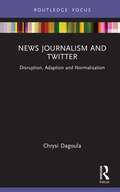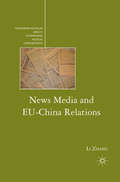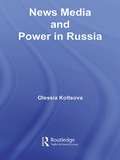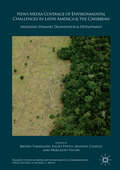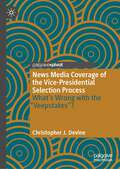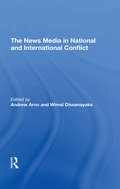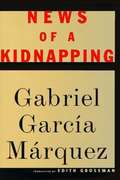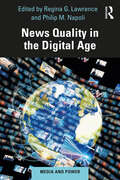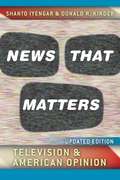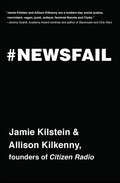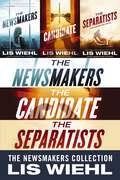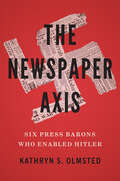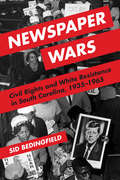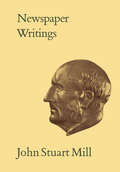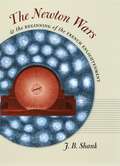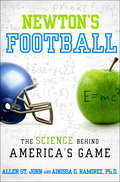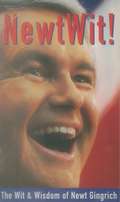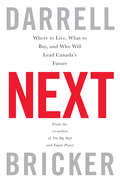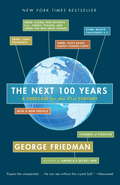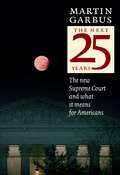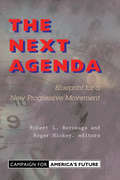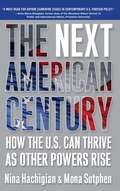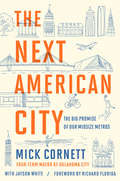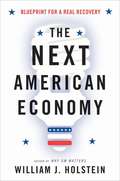- Table View
- List View
News Journalism and Twitter: Disruption, Adaption and Normalisation (Disruptions)
by Chrysi DagoulaThis book provides a critical account of the impact of Twitter on journalism, exploring how the news media has adapted to and normalised the use of the platform in the industry. Offering a comprehensive understanding of Twitter uses for journalistic purposes, this book explores the platform’s use as a ‘global village’, as an ambient news environment, and as a global marketplace. Drawing on two empirical case studies (United Kingdom and Greece), Dagoula examines academic conceptualisations of Twitter, journalists’ self-perceptions, and uses of the platform by a variety of media outlets and journalists. Adopting an evolutionary approach known as punctuated equilibrium, which consists of three stages of disruption, adaption, and normalisation, the author reveals the costs and benefits of Twitter’s impact on both the institutional values and practices of news journalism today. News Journalism and Twitter is an invaluable resource for researchers and students of digital journalism and media studies.
News Media and EU-China Relations
by Li ZhangThis book investigates the role of the news media in the development of EU-China relations in the post-Cold War era.
News Media and Power in Russia (BASEES/Routledge Series on Russian and East European Studies #Vol. 24)
by Olessia KoltsovaThe end of communist rule in the Soviet Union brought with it a brave new world of media and commerce. Formerly state-owned enterprises were transformed, often through private ownership, and new corporations sprung up overnight to take advantage of the new atmosphere of freedom. Until now, most research on media and news production in Russia has focused on the scope of government control and comparisons with the communist era. However, extra-governmental controls and the challenges of operating in a newly capitalist environment have been just as important – if not more so – in the formation of the new media climate. Filling the gap in the literature, this book examines the various agents who ‘make’ the news, and discusses the fierce struggle among the various agents of power involved. Drawing on existing theories and scholarship, the book provides a wealth of detail on the actual daily practices of news production in Russia. Original research is combined with compelling first-hand accounts of news production and dissemination to provide an incisive look at the issues and power structures Russian journalists face on a daily basis.
News Media Coverage of Environmental Challenges in Latin America and the Caribbean: Mediating Demand, Degradation and Development (Palgrave Studies in Media and Environmental Communication)
by Bruno Takahashi Juliet Pinto Manuel Chavez Mercedes VigónThis edited collection provides a unique survey of the ways in which news media organizations across Latin America and the Caribbean cover global, regional and local environmental issues and challenges. There is growing recognition within academia, governments, industries, NGOs and civil society about the importance of strategic communication and the news media in informing current societal and policy discussions about environmental issues. With this in mind, this volume explores the content of reporting as well as the structural and individual contests faced by media organizations and journalists, with a focus on the very unique political, social, cultural and environmental conditions that affect the countries individually. The book provides a survey of the most relevant and current environmental issues that have attracted public attention across the region and within countries in Latin America and the Caribbean in the first part of the 21st century.This volume will be of interest to students, instructors and researchers interested in Latin America and the Caribbean, media and the environment.
News Media Coverage of the Vice-Presidential Selection Process: What's Wrong with the "Veepstakes"?
by Christopher J. DevineThis book provides the first systematic, empirical analysis of the media’s approach to US vice-presidential selection (or the “veepstakes”). In their news coverage, Devine finds that media outlets typically treat vice-presidential selection as little more than a game—by focusing on how potential running mates might help to win the election, rather than how they might help the next president to govern. Based on an original content analysis of hundreds of veepstakes profiles from 2000–2020, this book quantifies the news media’s relative emphasis on various selection criteria, in general and across different electoral circumstances. The analysis suggests that journalists generally fail to serve the public interest by emphasizing electoral over governing considerations. However, Devine also points to positive examples of media coverage that help the public to evaluate potential running mates’ governing credentials, and suggests ways in which scholars, journalists, and citizens might encourage media outlets to provide more substantive, responsible coverage of the vice-presidential selection process in future elections.
The News Media In National And International Conflict
by Wimal Dissanayake Andrew ArnoIronically, as telecommunications technology—the embodiment of modernity—advances, bringing people in different nations into more direct contact during conflict situations, traditional cultural factors become increasingly important as differing ways of thinking and acting collide. The mass media can be seen as a factor in the creation of international conflict; they also, claim many scholars, are the key to control and resolution of those problems. Whichever side of the coin one chooses to look at—mass communication as cause or cure of conflict—there is no doubt that the news media are no longer peripheral players on the global scene; they are important participants whose organizational patterns of behavior, values, and motivations must be taken into account in understanding national and international conflict. In this volume, a distinguished group of authors explores the variety of ways the news media—newspapers, radio, and television—are involved in conflict situations. Conflicts between the United States and Iran, India and Pakistan, and the United States and China are examined, and national-level studies in Sri Lanka, Iran, Hong Kong, and the United States provide varied contexts in which the authors look at the complex interrelationships among government, news media, and the public in conflict situations.
News of a Kidnapping
by Gabriel García MárquezStory of the 1990 kidnapping of 10 Colombians by narcotraffickers.
News Quality in the Digital Age (Media and Power)
by Regina G. Lawrence Philip M. NapoliThis book brings together a diverse, international array of contributors to explore the topics of news “quality” in the online age and the relationships between news organizations and enormously influential digital platforms such as Facebook, Google, and Twitter. Covering topics ranging from internet incivility, crowdsourcing, and YouTube politics to regulations, algorithms, and AI, this book draws the key distinction between the news that facilitates democracy and news that undermines it. For students and scholars as well as journalists, policymakers, and media commentators, this important work engages a wide range of methodological and theoretical perspectives to define the key concept of “quality” in the news media.
News that Matters: Television and American Opinion, Updated Edition
by Shanto Iyengar Donald R. KinderAlmost twenty-five years ago, Shanto Iyengar and Donald R. Kinder first documented a series of sophisticated and innovative experiments that unobtrusively altered the order and emphasis of news stories in selected television broadcasts. Their resulting book News That Matters, now hailed as a classic by scholars of political science and public opinion alike, is here updated for the twenty-first century, with a new preface and epilogue by the authors. Backed by careful analysis of public opinion surveys, the authors show how, despite changing American politics, those issues that receive extended coverage in the national news become more important to viewers, while those that are ignored lose credibility. Moreover, those issues that are prominent in the news stream continue to loom more heavily as criteria for evaluating the president and for choosing between political candidates. “News That Matters does matter, because it demonstrates conclusively that television newscasts powerfully affect opinion. . . . All that follows, whether it supports, modifies, or challenges their conclusions, will have to begin here. ”—The Public Interest
News That Matters: Television & American Opinion (Chicago Studies In American Politics Ser.)
by Shanto Iyengar Donald R. KinderAlmost twenty-five years ago, Shanto Iyengar and Donald R. Kinder first documented a series of sophisticated and innovative experiments that unobtrusively altered the order and emphasis of news stories in selected television broadcasts. Their resulting book News That Matters, now hailed as a classic by scholars of political science and public opinion alike, is here updated for the twenty-first century, with a new preface and epilogue by the authors. Backed by careful analysis of public opinion surveys, the authors show how, despite changing American politics, those issues that receive extended coverage in the national news become more important to viewers, while those that are ignored lose credibility. Moreover, those issues that are prominent in the news stream continue to loom more heavily as criteria for evaluating the president and for choosing between political candidates.“News That Matters does matter, because it demonstrates conclusively that television newscasts powerfully affect opinion. . . . All that follows, whether it supports, modifies, or challenges their conclusions, will have to begin here.”—The Public Interest
Newsfail
by Jamie Kilstein Allison KilkennyA hilarious and informative primer on the most urgent issues of our day, from the creators and co-hosts of Citizen Radio, a 100% listener-supported show whose slogan is "independent radio that won't lead you to war."#Newsfail is not your grandmother's comedic-memoir-slash-political-manifesto. From page one (in a preface titled, "In Which the Authors Interview Ralph Nader in the Bathtub"), comedian Jamie Kilstein and journalist Allison Kilkenny pledge to give you the news like you've never gotten it before. On issues ranging from feminism to gun control, climate change to class war, foreign policy to net neutrality, they tell you how the mainstream media gets it left, right, and utterly, unforgivably, irresponsibly wrong--think Noam Chomsky as channeled by Fred and Carrie from "Portlandia." #Newsfail is all this, plus the story of Allison and Jamie's own DIY foray into independent media via their podcast, Citizen Radio, which has featured guests such as Jeremy Scahill, Sarah Silverman, Glenn Greenwald, and Neil deGrasse Tyson, and been downloaded millions of times by people all over the world. Their mission is truth-telling above brainwashing. All you have to do is listen.
The Newsmakers Collection: The Newsmakers, The Candidate, The Separatists (A Newsmakers Novel)
by Lis Wiehl Sebastian StuartThe NewsmakersTV reporter Erica Sparks has become a superstar overnight. Is it due to her hard work and talent, or is she at the center of a spiraling conspiracy?On her very first assignment, Erica inadvertently witnesses—and films—a horrific tragedy, scooping all the other networks. Mere weeks later, another tragedy strikes—again, right in front of Erica and her cameras.Erica will stop at nothing to uncover the truth. But she has to make sure disaster—and her troubled past—don’t catch up with her first.The CandidateHow far will a candidate go to become president? Erica Sparks—America’s top-rated cable-news host—is about to find out.Mike Ortiz is a dynamic war hero favored to win the White House. Standing by his side is his glamorous and adoring wife, Celeste. But something about this seemingly perfect couple troubles Erica.The Candidate is packed with political intrigue and media manipulation as the lust for power turns deadly indeed.The SeparatistsAfter getting the green light from her network to launch an investigative news show, Erica flies to Bismarck, North Dakota, to investigate Take Back Our Homeland, the largest secessionist group. What she finds is profoundly disturbing—a growing threat to the future of our union.Then she discovers a potential informant murdered in her Bismarck hotel. Take Back Our Homeland might be even more dangerous than she had thought—and she’s unwittingly become one of the key players in the story. Her fear and anxiety escalate—for her marriage, her daughter, and her own life.
The Newspaper Axis: Six Press Barons Who Enabled Hitler
by Kathryn S. OlmstedHow six conservative media moguls hindered America and Britain from entering World War II &“A landmark in the political history of journalism.&”—Michael Kazin, author of What It Took to Win: A History of the Democratic Party As World War II approached, the six most powerful media moguls in America and Britain tried to pressure their countries to ignore the fascist threat. The media empires of Robert McCormick, Joseph and Eleanor Patterson, and William Randolph Hearst spanned the United States, reaching tens of millions of Americans in print and over the airwaves with their isolationist views. Meanwhile in England, Lord Rothermere&’s Daily Mail extolled Hitler&’s leadership and Lord Beaverbrook&’s Daily Express insisted that Britain had no interest in defending Hitler&’s victims on the continent. Kathryn S. Olmsted shows how these media titans worked in concert—including sharing editorial pieces and coordinating their responses to events—to influence public opinion in a right-wing populist direction, how they echoed fascist and anti‑Semitic propaganda, and how they weakened and delayed both Britain&’s and America&’s response to Nazi aggression.
Newspaper Wars: Civil Rights and White Resistance in South Carolina, 1935-1965
by Sid BedingfieldAgainst all odds, the seeds of social change found purchase in mid-twentieth century South Carolina. Newspaperman John McCray and his allies at the Lighthouse and Informer challenged readers to "rebel and fight"--to reject the "slavery of thought and action" and become "progressive fighters" for equality. Newspaper Wars traces the role journalism played in the fight for civil rights in South Carolina from the 1930s through the 1960s. Moving the press to the center of the political action, Sid Bedingfield tells the stories of the long-overlooked men and women on the front lines of a revolution. African American progress sparked a battle to shape South Carolina's civic life, with civil rights activists arrayed against white journalists determined to preserve segregation through massive resistance. As that strategy failed, white newspapers turned to overt political action and crafted the still-prevalent narratives that aligned southern whites with the national conservative movement. A fascinating portrait of a defining time, Newspaper Wars analyzes the role journalism played--and still can play--during times of social, cultural, and political change.
Newspaper Writings: Volumes XXII-XXV
by Ann Robson John Robson John Stuart MillFor just over fifty years John Stuart Mill contributed articles and letters to the newspapers, setting before the public a radical position on contemporary events. From 1822 to 1873, in newspapers as widely read as The Times and the Morning Chronicle, and as narrowly circulated as the True Sun and the New Times, he praised his friends and damned his opponents, while commenting on a while range of issues at home and abroad, from banking to Ireland, from wife-beating to land nationalization. His main series of newspaper writings concerned France (especially during the first four years of the Revolution of 1830) and Ireland (especially during December 1846 and January 1847, when various proposals for relief of the starving cottiers were being debated). Mill felt himself peculiarly fitted to explain French affairs and Irish solutions to the non-comprehending and wrong-headed English. But his pen was wielded wherever he say stupidity and narrowness, and he found them in astonishingly varied areas. He tried to explain to his obdurate countrymen the first principles of law reform, political economy, relations between the sexes, democracy, international law, and much more. Virtually none of these texts have been reprinted before this volume. The Introduction by Ann Robson sets the items in their historical and personal perspective, and draws out the implications for Mill's life and thought. The Textual Introduction by John Robson gives an account of the sources of the texts, and lays out principles and methods followed in the editing. The Mill that emerges from these pages is a fighting journalist, uninhibited, forthright, and often brilliantly satirical, testing his theoretical opinions in the real world, gradually maturing and developing a practical philosophy whose influence has been felt well into our own time.
The Newton Wars and the Beginning of the French Enlightenment
by J. B. ShankNothing is considered more natural than the connection between Isaac Newton's science and the modernity that came into being during the eighteenth-century Enlightenment. Terms like "Newtonianism" are routinely taken as synonyms for "Enlightenment" and "modern" thought, yet the particular conjunction of these terms has a history full of accidents and contingencies. Modern physics, for example, was not the determined result of the rational unfolding of Newton's scientific work in the eighteenth century, nor was the Enlightenment the natural and inevitable consequence of Newton's eighteenth-century reception. Each of these outcomes, in fact, was a contingent event produced by the particular historical developments of the early eighteenth century. A comprehensive study of public culture,The Newton Wars and the Beginning of the French Enlightenmentdigsbelow the surface of the commonplace narratives that link Newton with Enlightenment thought to examine the actual historical changes that brought them together in eighteenth-century time and space. Drawing on the full range of early modern scientific sources, from studied scientific treatises and academic papers to book reviews, commentaries, and private correspondence, J. B. Shank challenges the widely accepted claim that Isaac Newton's solitary genius is the reason for his iconic status as the father of modern physics and the philosophemovement.
Newton's Football
by Ainissa G. Ramirez Allen St. JohnIn the bestselling tradition of Freakonomics and Scorecasting comes a clever and accessible look at the big ideas underlying the science of football. Did you hear the one about the MacArthur genius physicist and the NFL coach? It's not a joke. It's actually an innovative way to understand chaos theory, and the remarkable complexity of modern professional football. In Newton's Football, journalist and New York Times bestselling author Allen St. John and TED Speaker and former Yale professor Ainissa Ramirez explore the unexpected science behind America's Game. Whether it's Jerry Rice finding the common ground between quantum physics and the West Coast offense or an Ivy League biologist explaining--at a granular level--exactly how a Big Mac morphs into an outside linebacker, Newton's Football illuminates football--and science--through funny, insightful stories told by some of the world's sharpest minds. With a clear-eyed empirical approach--and an exuberant affection for the game--St. John and Ramirez address topics that have long beguiled scientists and football fans alike, including: * the unlikely evolution of the football (or, as they put it, "The Divinely Random Bounce of the Prolate Spheroid") * what Vince Lombardi has in common with Isaac Newton * how the hardwired behavior of monkeys can explain a head coach's reluctance to go for it on fourth-down * why a gruesome elevator accident jump-started the evolution of placekicking * how Teddy Roosevelt saved football using the same behavioral science concept that Dreamworks would use to save Shrek * why woodpeckers don't get concussions * how better helmets actually made the game more dangerous Every Sunday the NFL shares a secret with only its savviest fans: The game isn't just a clash of bodies, it's a clash of ideas. The greatest minds in football have always possessed an instinctual grasp of science, understanding the big ideas and gritty realities that inform the game's rich past, as well as its increasingly uncertain future. Blending smart reporting, counterintuitive creativity, and compelling narrative, Newton's Football takes gridiron analysis to the next level, giving fans a book that entertains, enlightens, and explains the game anew.Advance praise for Newton's Football "It was with great interest that I read Newton's Football. I'm a fan of applying of science to sport and Newton's Football truly delivers. The stories are as engaging as they are informative. This is a great read for all football fans."--Mark Cuban"Equal parts Isaac Newton and Cam Newton, this book is as thoroughly entertaining and engrossing as a fall Sunday afternoon on the couch."--L. Jon Wertheim, executive editor of Sports Illustrated and bestselling co-author of Scorecasting "Nothing is more bipartisan than America's love for football. And Newton's Football will unite readers of all stripes by merging science and sports in a fresh and fascinating fashion. Read this book and you'll never again watch a game the same way."--Chris Mooney, New York Times bestselling author of The Republican War on Science"A fascinating melding of science and sport, at once lively and illuminating, rich with knowledge of the game and arresting explanations of its winning strategies."--Daniel J. Kevles, Yale UniversityFrom the Hardcover edition.
Next: Where to Live, What to Buy, and Who Will Lead Canada's Future
by Darrell BrickerFollow a link to an ad in a sponsored email and, no matter your age or stage of life, you will likely be directed to a product that marketers believe is right for you. More often than not, the ad will target those with a younger, trendier, hipper lifestyle, offering you products you never knew you needed or wanted. Companies market to a younger audience because they believe that’s where the money and the excitement are. But are they wrong? Perhaps very wrong?This is only one of the counterintuitive arguments that Darrell Bricker, CEO of Ipsos Public Affairs, a world leader in opinion polling, tackles in his groundbreaking new book, Next. Not since Boom, Bust & Echo has a Canadian expert in what Canadians will want and need distilled the growing trends based on real and extensive demographic data and dared to forecast what will come next in a major publication. Why is Harley-Davidson making smaller motorcycles and changing the way they sell their bikes? Should restaurateurs be focusing on vibrant, frenetic restaurants offering the latest food fashion or on open, quieter restaurants that focus on tasty standard fare? What’s the fastest-growing sector in the housing market? Where should companies plan on setting up shop? Why do we face a population crisis? Which provinces will become the haves and which the have-nots? Where will Canadians be emigrating from, and where will they live? Should we be building more hockey arenas or basketball courts, or even cricket pitches?Next is the first book in decades that offers an honest, often provocative prescription for where we will live, what we’ll be buying and who our leaders will be in the decades to come. Filled with stories of Canadians making critical decisions for their businesses and their personal lives, Next will appeal to a wide audience: anyone who is wondering where they should look for their next job or where they might plan on living in retirement—even how they will live in Canada’s ever-changing future.
The Next 100 Years: A Forecast For The 21st Century
by George Friedman"Conventional analysis suffers from a profound failure of imagination. It imagines passing clouds to be permanent and is blind to powerful, long-term shifts taking place in full view of the world." --George Friedman. In his long-awaited and provocative new book, George Friedman turns his eye on the future--offering a lucid, highly readable forecast of the changes we can expect around the world during the twenty-first century. He explains where and why future wars will erupt (and how they will be fought), which nations will gain and lose economic and political power, and how new technologies and cultural trends will alter the way we live in the new century. The Next 100 Years draws on a fascinating exploration of history and geopolitical patterns dating back hundreds of years. Friedman shows that we are now, for the first time in half a millennium, at the dawn of a new era--with changes in store, including: * The U.S.-Jihadist war will conclude--replaced by a second full-blown cold war with Russia. * China will undergo a major extended internal crisis, and Mexico will emerge as an important world power. * A new global war will unfold toward the middle of the century between the United States and an unexpected coalition from Eastern Europe, Eurasia, and the Far East; but armies will be much smaller and wars will be less deadly. * Technology will focus on space--both for major military uses and for a dramatic new energy resource that will have radical environmental implications. * The United States will experience a Golden Age in the second half of the century. Written with the keen insight and thoughtful analysis that has made George Friedman a renowned expert in geopolitics and forecasting, The Next 100 Years presents a fascinating picture of what lies ahead. For continual, updated analysis and supplemental material, go to www.Stratfor.com.
The Next 25 Years: The New Supreme Court and What it Means for Americans
by Martin GarbusIn The Next 25 Years, renowned First Amendment lawyer Martin Garbus examines what will be the impact of the new Supreme Court on the future of our republic. Drawing on extensive knowledge of Constitutional law and legal precedents, Garbus, one of our most astute legal historians, defrocks the executive branch's grip over the judiciary as an extension of its own executive powers. He warns of the threat of an incoming "textualist" bench that wishes to roll back more than a century's worth of hard-won reforms. And he offers the first clear-eyed account of how the coming bench may imperil our way of life and endanger the liberties you may have thought were our inalienable rights.
The Next Agenda: Blueprint For A New Progressive Movement
by Robert L. BorosageIn The Next Agenda, editors Robert Borosage and Roger Hickey of the Campaign for America's Future have gathered essays written by some of America's most progressive thinkers and activists that lay out ideas and reforms to address the serious issues facing us today. They argue that the economic prosperity of the last decade can only be sustained if it is more widely shared. And they call for a new progressive movement to forge new rules for the global economy just as the Progressives of the last century tamed the excesses of America's national economy.Each of the fourteen essays in The Next Agenda detail the context that makes fundamental reform both necessary and possible and outlines the policy proposals that are vital to begin meeting the challenge. David Moberg, reporter for In These Times, writes about reforming labor law to empower workers whose voices have been drowned out by globalization. Richard Rothstein, education columnist for the New York Times, writes of the growing shortage of classrooms and teachers and suggests reform initiatives for public education. Ted Marmor of the Yale School of Management, and Jon Oberlander, of the University of North Carolina-Chapel Hill, provide a plan to make affordable, comprehensive health care available to everyone. Carl Pope of The Sierra Club and a leader of the environmental movement joins with labor leader Robert Wages, of PACE International, to lay out elements of a Green Growth agenda, detailing how labor and environmentalists can combine in promoting sensible investments for sustainable growth. These forward-thinking essays serve as a springboard for national debate and provide an ambitious agenda for the next administration.
The Next American Century: How the U.S. Can Thrive as Other Powers Rise
by Nina Hachigian Mona SutphenThe rise of other global powers is most often posed as a sorry tale, full of threats to America's primacy, prosperity, and way of life. The potential loss of our #1 status implies a blow to our safety, economy, and prestige. But this is a rare moment in history: none of the world's big powers is our adversaries. In The Next American Century, Nina Hachigian and Mona Sutphen show that the "pivotal powers" -- China, Europe, India, Japan, and Russia -- seek greater influence, but each has an enormous stake in the world economy and a keen desire to thwart common threats. India is a key ally in the struggle against terrorism. China's help is essential to containing pandemic disease. Russia is leading an effort to keep nuclear devices out of terrorists' hands. Japan and Europe are critical partners in tackling climate change. None of these countries is a direct military or ideological challenger. In fact, their gains largely help, rather than hurt, America's continuing prosperity, growth, and, to some extent, even its values. Will we have conflicts with these powers? Definitely. Some will be serious. But, by and large, they want what we want: a stable world and better lives for their citizens. We live in an era of opportunity, not of loss. To take advantage of this moment, the United States must get its own house in order, making sure that American children can compete, American workers can adjust, America's military remains cutting-edge, and American diplomacy entices rather than alienates. While America must be prepared for the possibility that a hostile superpower may one day emerge, it has to be careful not to turn a distant, uncertain threat into an immediate one. Washington should welcome the pivotal powers into a vigorous international order to share the burden of solving pressing global problems of peace, climate, health, and growth. The avenue to a truly safer and more prosperous world runs through the pivotal powers. With them, we can build a world where Americans will thrive, today and tomorrow.
The Next American City: The Big Promise of Our Midsize Metros
by Jayson White Mick CornettFrom four-term Oklahoma City Mayor Mick Cornett, a hopeful and illuminating look at the dynamic and inventive urban centers that will lead the United States in coming years.Oklahoma City. Indianapolis. Charleston. Des Moines. What do these cities have in common? They are cities of modest size but outsized accomplishment, powered by a can-do spirit, valuing compromise over confrontation and progress over political victory. These are the cities leading America . . . and they're not waiting for Washington's help. As mayor of one of America's most improved cities, Cornett used a bold, creative, and personal approach to orchestrate his city's renaissance. Once regarded as a forgettable city in "flyover country," Oklahoma City has become one of our nation's most dynamic places-and it is not alone. In this book, Cornett translates his city's success-and the success of cities like his-into a vision for the future of our country. The Next American City is a story of civic engagement, inventive public policy, and smart urban design. It is a study of the changes re-shaping American urban life-and a blueprint for those to come.
The Next American Economy: Blueprint for a Real Recovery
by William HolsteinAt a time when debate is raging about how to create jobs and revive the American economy, veteran business writer William J. Holstein argues that the best way for us to recover our economic footing is to do what Americans do best--innovate and create new industries. Contrary to the perception that the American economy has run out of inspiration and new ideas, Holstein uses compelling case studies to celebrate the innovation and business success being experienced in many industries, from technology and energy to retraining and exporting, across the country, from Boston to Orlando, Pittsburgh to San Diego. In the face of economic powerhouses such as Japan and China that are pursuing conscious national strategies, Holstein argues that Americans must find new avenues of cooperation among universities, business, and government to create the kind of sustainable growth we need. Replete with fresh insights into how Americans can create a real economic recovery,The Next American Economyis essential reading for business leaders, politicians, strategists, and anyone who cares about our future.
